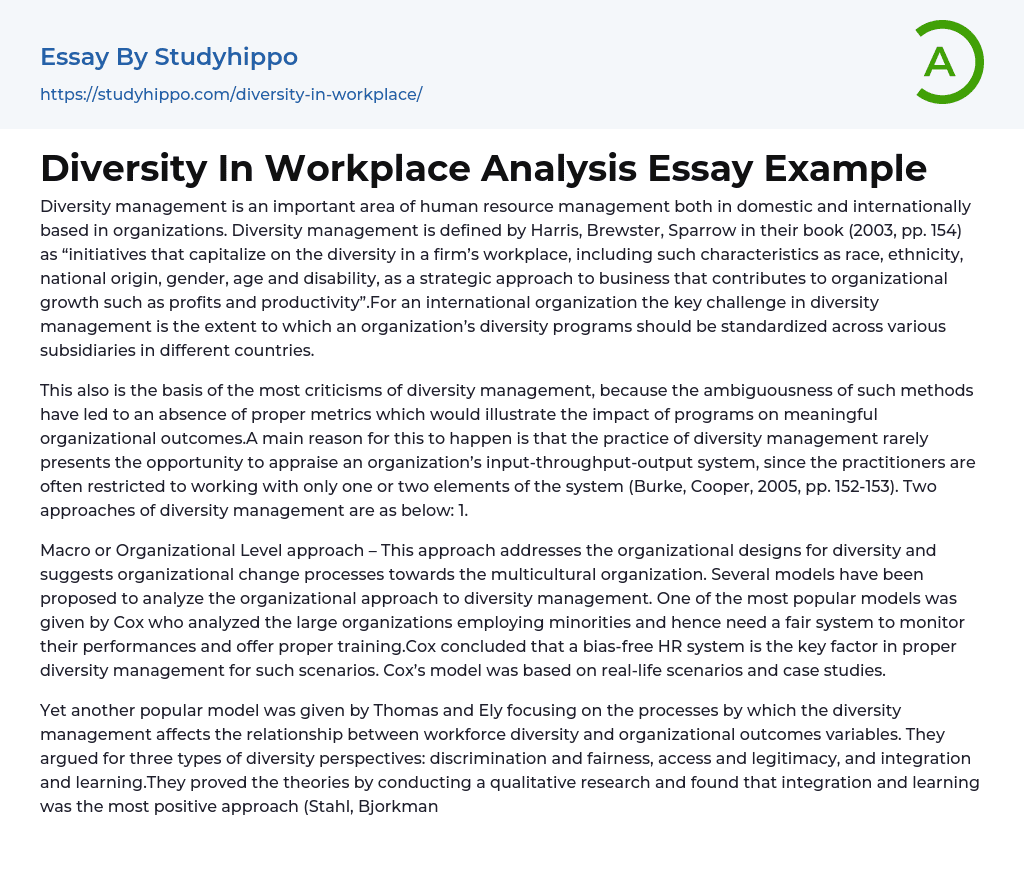The management of diversity is a crucial aspect of human resource management, both domestically and internationally in organizations. The definition of diversity management by Harris, Brewster, and Sparrow (2003, pp. 154) is the utilization of diversity in the workplace as a strategic measure to contribute to organizational growth, including factors such as race, ethnicity, national origin, gender, age, and disability that may impact an organisation's profits and productivity. In the context of an international organization, diversity programs should be standardized across all subsidiaries situated in different countries.
The lack of proper metrics to illustrate the impact of diversity management programs on organizational outcomes has led to criticisms of such methods. This ambiguity stems from the limited opportunity for practitioners to appraise an organization’s input-throughput-output system, as they are often restricted to working with only o
...ne or two elements of the system. According to Burke and Cooper (2005), this is a main reason for the criticism. There are two approaches to diversity management:
1.
The Macro or Organizational Level approach focuses on diversity in organizational designs and suggests change processes towards a multicultural environment. Various models have been proposed to analyze diversity management at the organizational level. One of the widely accepted models, introduced by Cox, examined the HR system in large organizations that employ minorities and require a fair system to monitor their performance and provide appropriate training. According to Cox's model, a bias-free HR system is essential for successful diversity management in such situations. The model was developed based on actual cases and scenarios.
Thomas and Ely proposed a popular diversity management model which examines how diversity management impacts the relationship between workforce diversit
and organizational outcomes. The model includes three diversity perspectives: discrimination and fairness, access and legitimacy, and integration and learning. Through qualitative research, they found that the integration and learning perspective was the most effective approach (Stahl, Bjorkman, 2006, pp. 223-230). Additionally, Dick and Petersen developed a micro level approach utilizing psychological models of discrimination and inter-group relations to design interventions that reduce conflict and promote cooperation. This approach also emphasizes addressing stereotypes and prejudices from a socio-psychological perspective in diversity management interventions.
Human resource managers involved in diversity issues should understand the complicated effects of stereotypes, prejudices, and organizational context to create effective interventions for managing diversity. According to Stahl and Bjorkman (2006, pp.231-240), diversity management strategies should be tailored to the particular situation since people management practices can differ greatly. While managing diversity is crucial, it is also challenging. Blind and inflexible approaches are not recommended as they increase the likelihood of underlying prejudice within the organization.
- Performance essays
- Human Resources essays
- Recruitment essays
- Code of Ethics essays
- Organizational Behavior essays
- Dress Code essays
- Safety essays
- Conflict essays
- Qualities essays
- Working Time essays
- Collective Bargaining essays
- Organizational Structure essays
- Organizational Culture essays
- Workstation essays
- Sweatshops essays
- Working capital essays
- Job Satisfaction essays
- Working Class essays
- Hard Work essays
- Workforce essays
- Corporate Culture essays
- Ageism essays
- Cultural Diversity essays
- Discrimination essays
- Diversity essays
- Gender Discrimination essays
- Multiculturalism essays
- Oppression essays
- Peer Pressure essays
- Racial Profiling essays
- Sexism essays
- Accounting essays
- Andrew Carnegie essays
- Automation essays
- Business Cycle essays
- Business Intelligence essays
- Business Model essays
- Business Operations essays
- Business Software essays
- Cooperation essays
- Cooperative essays
- Corporate Social Responsibility essays
- Corporation essays
- Customer Relationship Management essays
- Family Business essays
- Franchising essays
- Harvard Business School essays
- Harvard university essays
- Human Resource Management essays
- Infrastructure essays




